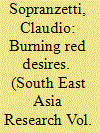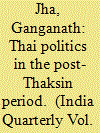|
|
|
Sort Order |
|
|
|
Items / Page
|
|
|
|
|
|
|
| Srl | Item |
| 1 |
ID:
117062


|
|
|
|
|
| Publication |
2012.
|
| Summary/Abstract |
The Red Shirt movement, which reached its peak during May 2010, has been met with puzzlement and ambiguity by media and scholars in and beyond Thailand. Often presented as a one-man-driven movement or a 'peasant revolt', the movement has remained opaque to many observers. This article analyses the ongoing conflict through the eyes of Isan (North Eastern Thai) migrants in Bangkok, especially motorcycle taxi drivers, as motivated by 'politics of desire'. In particular, the article explores how desires for consumption are voiced by a new emerging regional middle class with a diffuse feeling of being stuck between an agricultural past and a self-employed present, due to structural limitations on social and personal development. The author examines the historical emergences and failures of these desires in a complex web of conflicting and overlapping claims to representation, capitalism and class mobility. Positioning desires at the core of the analysis and exploring their configuration and suppression in Thailand through discourses of capitalist access, self-sufficiency and social justice allows severed links to be recovered and apparent contradictions to be reconfigured. This seems necessary to understand the otherwise disconnected and incomprehensible economic, discursive and spatial dimensions of the Thai political conflict.
|
|
|
|
|
|
|
|
|
|
|
|
|
|
|
|
| 2 |
ID:
117184


|
|
|
|
|
| Publication |
2012.
|
| Summary/Abstract |
The spilling of blood in modern political protest is an exceptional event. This article discusses the deployment of blood as a means of struggle by the members of an extra-parliamentary movement, known as the 'red shirts', in March 2010, in the course of their prolonged attempt to topple the government of the Thai prime minister Abhisit Vejjajiva. Two contesting discourses of blood are discussed: the symbolic discourse of blood as a self-sacrificial act deployed by the protesters to curse their enemies, and the medical counter-discourse deployed by the authorities, in an effort to neutralise the protesters' act. Several issues raised by the blood-spilling act are examined: its perceived appropriateness, its ritual roots and its disputed effectiveness as a curse. In conclusion, it is suggested that the blood ritual constitutes a reflective move to counter the prevailing 'regime of images' in Thai society.
|
|
|
|
|
|
|
|
|
|
|
|
|
|
|
|
| 3 |
ID:
117063


|
|
|
|
|
| Publication |
2012.
|
| Summary/Abstract |
This paper examines the links between Bangkok's smoking skyline and the political and economic aspirations of North Eastern Thais. The author proposes that much of what was at stake during the 2009 and 2010 political upheaval was closely tied to a constricted sense of citizenship apparent in the frustrated political and economic aspirations expressed by North East Thailand's urban poor. Through an ethnographic analysis of the experiences of residents of Khon Kaen's railway communities as they participate in a new housing project, the paper explores the obstacles that poor citizens encounter when they try to 'become right with the law' and 'unite' in the name of 'developing' themselves, their communities, their cities and their nation. In reflecting on the politics of belonging that arise during this project, the author's analysis reveals how hard these citizens work to comply with laws and to take part in national development projects, even when many of those same laws and processes frequently work against them. The author argues that, although coups and mass mobilizations form the most public faces of the current political moment, they simply reflect more pernicious, complex forms of the everyday politics facing poor citizens. Indeed, these frustrated aspirations expose the links between Bangkok's burning shopping malls and the charred provincial government buildings of the North East (Isan). The analysis suggests that the events of 2009 and 2010 were not an uprising against the state, but rather a movement demanding recognition and the opening of the political and economic order to the poor as full citizens.
|
|
|
|
|
|
|
|
|
|
|
|
|
|
|
|
| 4 |
ID:
109036


|
|
|
|
|
| Publication |
2011.
|
| Summary/Abstract |
hailand has been witnessing political uncertainties ever since the ouster of Prime Minister Thaksin Shinawatra. Although the 1997 Constitution of Thailand was one of the best in terms of evolving democratic institutions and Thaksin was one of the most popular leaders, yet the system could not work. Thaksin was disliked by the traditionally entrenched elite who joined together to remove him arbitrarily from power in which the military and the Royal Privy Council took a prominent part. The system that was adopted under military rule did not like to retain the 1997 constitution but decided to replace them with a new constitution (2007), in which the interests of the military were protected and promoted. In the evolving permutations and combinations, two groups-Yellow Shirts and Red Shirts-have emerged to oppose each other, often violently, to offer thesis and anti-thesis for and against Thaksin and his brand of politics. This article has tried to understand the dynamics of power politics in Thailand, the rise of the Yellow Shirts and Red Shirts and the emerging problems that Thailand will have to address in the future.
|
|
|
|
|
|
|
|
|
|
|
|
|
|
|
|
|
|
|
|
|